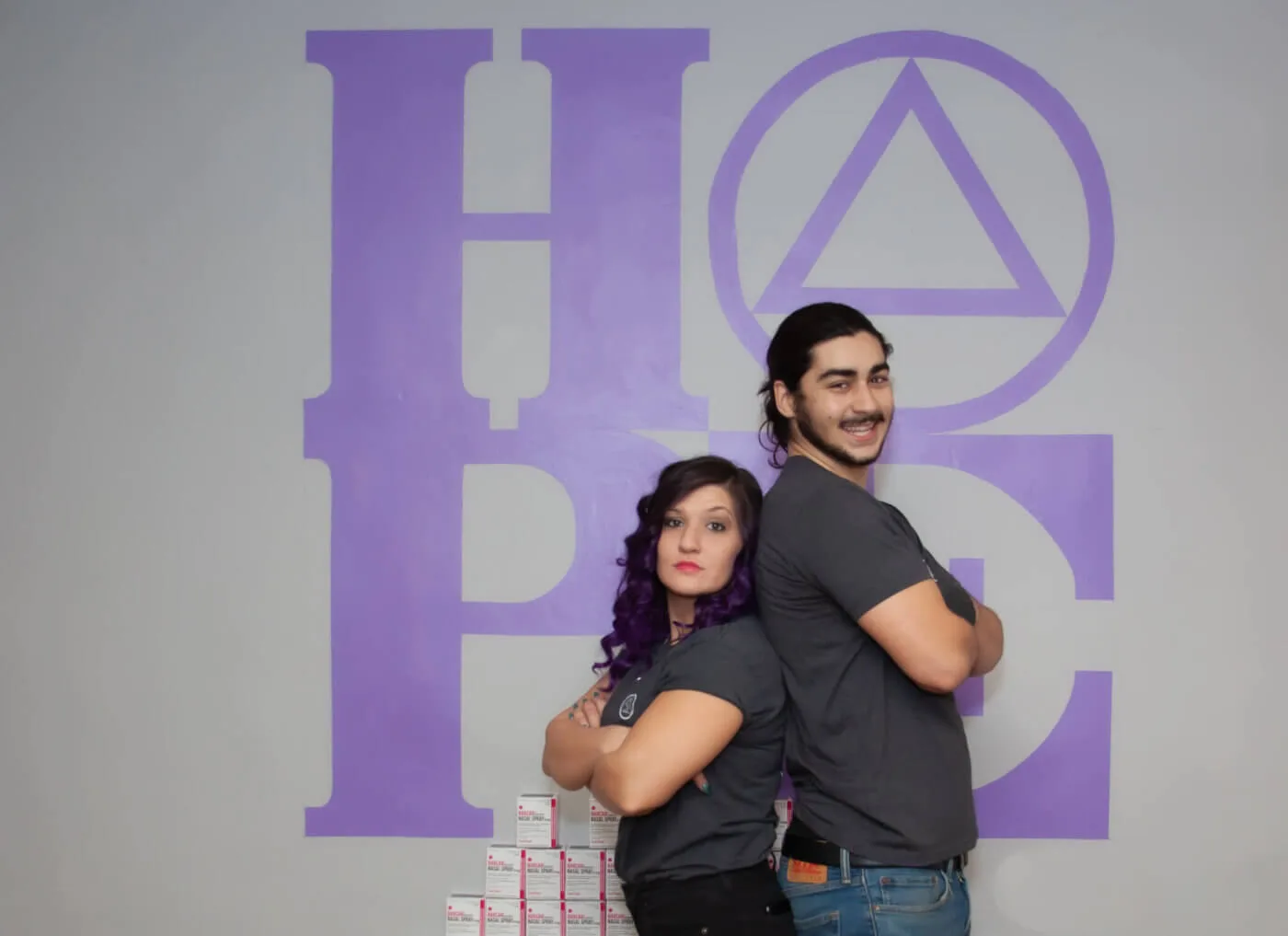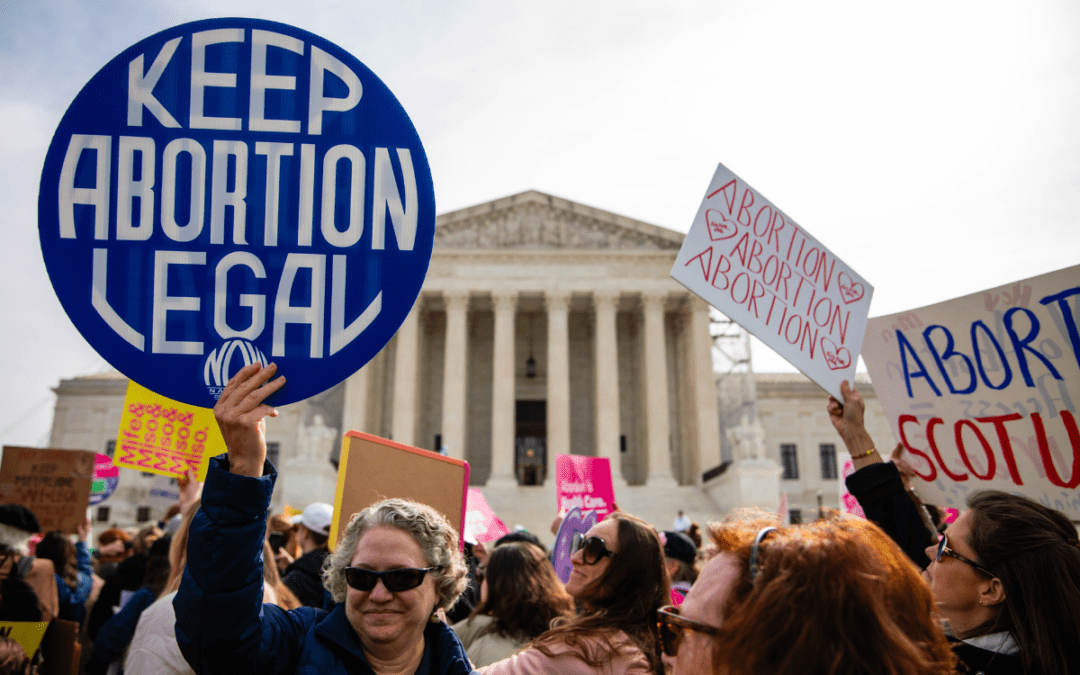
Sarah Laurel with her brother, Adam Al-Asad, who serves as the director of operations for Savage Sisters, in one of their South Philadelphia recovery houses. (Courtesy Sarah Laurel/Savage Sisters)
Sarah Laurel was a thriving professional who hit rock bottom due to addiction. Having turned her life around, she’s now working on behalf of those in recovery and on the streets with Savage Sisters.
PHILADELPHIA — The divide between where Sarah Laurel was and where she ended up might seem incomprehensible unless you understand the unrelenting grip the disease of addiction can have on someone’s life.
In her early 20s, Laurel, who was born and raised in South Philadelphia, was a successful account executive for a hotel chain, eventually rising to director of sales. She was making good money and living a comfortable life. She owned a home. She had a child. She was thriving. Then, in her mid-20s, Laurel began suffering from carpal tunnel syndrome, an ailment for which her doctor prescribed an opioid. That’s when Laurel said her “lifelong sentence” of addiction began.
Over the course of a decade, that lifelong sentence robbed Laurel of everything. Rehab centers and recovery houses granted her only a temporary reprieve from addiction—the backslide was always just around the corner. Laurel eventually found herself living on the streets where she was left for dead in a vacant lot following a brutal assault.
That assault seemed like it might spell the end of Laurel’s once-promising life. It actually proved to be the turning point toward recovery. As Laurel got sober and began to put her life back together, she focused her energies on helping others who were waging their own battles against addiction. In 2018, Laurel founded the recovery and outreach program Savage Sisters, a nonprofit with five recovery houses—three for women, two for men—all located within a two-block radius in her native South Philadelphia.
Laurel views Savage Sisters as her calling: “The universe delivered it to me and it’s become my divine purpose in life.”
The Origins of Laurel’s Opioid Addiction
Laurel’s story is not an uncommon one. Her addiction began in a doctor’s office. She suffered an injury and was prescribed an opioid.
“I was taking that prescription legally for a couple of years, then I was cut off completely, with no discussion about detox, or chemical dependency,” Laurel said. “I’m a Philly girl. Even though I’m a professional, I know how to get stuff on the street. I started purchasing Percocet on the street because I started experiencing withdrawal and dope sickness.”
Laurel’s dependency on opioids would trigger a cycle of poor choices that allowed addiction to overtake her life. She left her job in her late 20s and began bartending where a co-worker introduced her to heroin, a cheaper, and much more potent alternative to Percocet. First she snorted the drug, then began injecting it. As her life spiraled out of control, Laurel lost her home and her car, and was jailed several times. She moved in with her mother, who eventually took custody of her child.

All the while, Laurel was attempting to achieve sobriety, an endeavor that she said included some 30 trips to drug treatment facilities. Her process of trying to beat addiction typically involved moving from rehab facilities to various recovery houses—privately owned and operated residences meant to provide a drug and alcohol-free living environment for those in recovery. But given that recovery houses are not regulated in any way by the state (though that could be changing soon) and typically not subject to local ordinances, as is the case in Philadelphia, Laurel found the environment in many recovery houses not conducive to maintaining a sober lifestyle. Her cycle of addiction persisted.
“A lot of the recovery houses I went to were disgusting,” Laurel said. “There were no resources—no drug tests or any kind of support. It was just get a job, pay your rent, and shut the f— up.”
‘Darkness and Deprivation’
By the time Laurel was in her early 30s, she was homeless in the Kensington neighborhood of Philadelphia—a notorious haven for drug addicts, rife with danger and violence—addicted to heroin, crack, Xanax, and cocaine. Laurel had experienced the violence endemic within Kensington’s ecosystem of addicts and dealers before, but nothing like the altercation she had with three dealers in a trap house, where she was thrown from a second floor window, then beaten and dragged to a vacant lot to be left for dead.
Laurel sustained serious injuries from the incident, requiring multiple surgeries on her hips and legs. While her body was broken she said her spirit remained intact. Though confined to a wheelchair, when a friend asked if she wanted to help run a recovery house, Laurel accepted the invitation. She saw it as an opportunity to begin the long process of rebuilding her life, and a chance to help others in recovery.
“I had experienced so much darkness and deprivation in Kensington,” Laurel said. “I was a very broken human being. I did not know how to live. I was in a wheelchair so I was very humbled. But I wanted to help others. And I felt I could.”
As Laurel began to aid others with their recovery, her own battle against addiction started anew. She struggled to find work due to her rap sheet, so she got a job laying tile flooring. Laurel also began working a 12-step fellowship recovery program. “It was a spiritual journey that changed my life,” she said.
Helping Others Fight Addiction
Armed with the scars and wisdom from her own recovery experiences and the knowledge from the fellowship program, Laurel launched Savage Sisters. It began with a single recovery house for women in South Philadelphia. Laurel rented the home from her brother, Adam Al-Asad, who channels the inspiration he drew from his sister’s hard-fought battle with addiction into his role as the director of operations for Savage Sisters.
“Her battle with addiction is the thing that gave me the desire to to work with those in recovery and active addiction,” Al-Asad said. “Before she had exposed me to the reality of the life (addicts) endure, I had no sympathy for it because I didn’t understand it. That’s something we’re trying to battle as an organization. It’s the stigma of addiction. Just trying to make people aware of what those in addiction are going through is a disease, not a choice. Her recovery was a huge inspiration to the strategies that we use to help other people stay sober.”
As the executive director of Savage Sisters, Laurel’s aim is to create a safe space for those in recovery, as opposed to those recovery houses free to trade in what she characterizes as unethical and illegal practices due to the lack of state or local oversight.
“Our house is very structured,” Laurel said. “We have a curfew. We have chores. They have to get a job. We help them with their resumes. We pay for residents to get free dual diagnosis trauma therapy, free kickboxing, free yoga, and apiary therapy. We give them this myriad of options of healing, because it’s whole health management. It’s not just about putting the drug down. It’s about recreating your life and healing your body from all of the shit that you’ve just been through.”

The Savage Sisters name comes from the dress Laurel was wearing when she was left for dead in that vacant Kensington lot.
“The only thing I could see while I was in traction in the ICU was the word ‘savage’ across the chest on my dress,” Laurel said. “It stuck with me. Savage Sisters is chasing your recovery ferociously, with the same ferociousness you had to chase your drugs.”
Within the city, Savage Sisters’ outreach efforts are mostly concentrated on the Kensington streets where Laurel once lived. With the help of volunteers, they distribute food, clothing, the opioid overdose reversal drug Narcan, and harm reduction items like safe syringe kits to help lower the rate of infectious diseases being spread. Laurel has also been working with state Sens. Amanda Cappelletti (D-Montgomery) and John Kane (D-Chester) to spread awareness about harm reduction and Narcan training in the Philadelphia suburbs. Taking pre-emptive measures to fight addiction in the suburbs is crucial to Laurel, since she routinely sees so many addicts from outside the city limits on the streets of Kensington.
“I’m engaging with the people in Kensington every day; they’re not all Philadelphia residents that are homeless,” Laurel said. “They’re kids from the counties. It’s kids from Delco, Montco, Bucks, Chester, and kids from across the country who have heard about the open air drug market in Kensington and they come in droves.”
Laurel believes those people in her recovery houses can flourish and beat addiction. She believes those living on the streets of Kensington can be saved. She’s been where they’ve been. And she’s come out the other side with a mission to help put their lives back together.
“I’ve been in the darkest places you could be in, the depths of deprivation,” said Laurel, now 35. “I have been assaulted and stabbed publicly. I’ve seen someone be murdered. I’ve seen shootings. I’ve been covered by other people’s blood. I’ve been sexually assaulted. I’ve been robbed. There’s this darkness that envelops you. Coming out of that to the purpose of loving people, it changes you. I’ve had this amazing opportunity to have been in this dark place and see humans in that dark place and know they are fully capable of being in a wonderful place.”
Politics

How Project 2025 aims to ban abortion in Pennsylvania
Former president Donald Trump said abortion was a state’s rights issue recently, but conservative organizations, under the banner “Project 2025,”...

736,000 PA households could lose crucial help on their internet bills
Time is running out for the Affordable Connectivity Program, which provides low-cost high speed internet access for over 736,000 Pennsylvania...

What to know about Trump’s legal issues
Over the past year, former president Donald Trump has become the center of not one, not two, not three, but four criminal investigations, at both...
Local News

Conjoined twins from Berks County die at age 62
Conjoined twins Lori and George Schappell, who pursued separate careers, interests and relationships during lives that defied medical expectations,...

Railroad agrees to $600 million settlement for fiery Ohio derailment, residents fear it’s not enough
Norfolk Southern has agreed to pay $600 million in a class-action lawsuit settlement for a fiery train derailment in February 2023 in eastern Ohio,...






